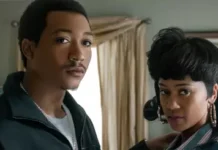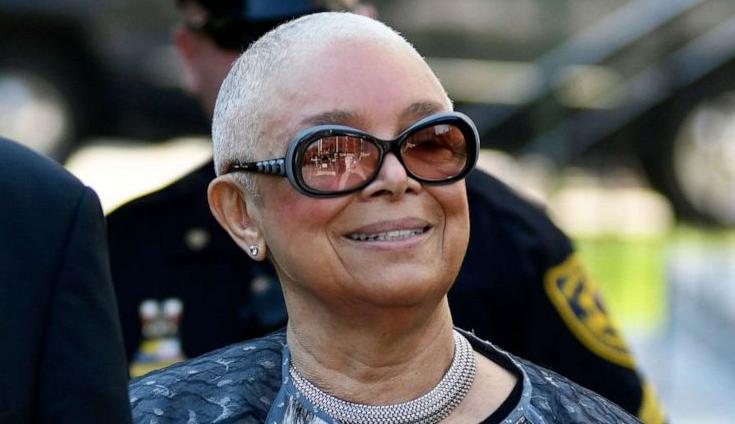
*Tasha Biltmore began her production company by generating a buzz for herself with a series of billboards stating only, “Who is Tasha B?” As a playwright, she promoted domestic violence advocacy and now has emerged as a director with her ‘Conversation Series’ television show. Her experience as a wife and mother inside of an abusive relationship is expressed through her scripts and the characters she puts within it.
There were many plays being produced at the time and my aim was to cover all of them, but what set Biltmore aside from the rest was her direct assault on morality under the disguise of domestic violence awareness. Coming from an action and adventure comic book background, I saw the underlying theme of, “What is right and wrong and trying to make a change,” and it resonated with me.
We conducted the interview in the historic Hudson Theater theater back in 2013, and we talked as the theater emptied. When it was empty and all the actors went on to celebrate, the stagehands made preparations to turn off the lights, we did her portrait. The empty seats of the theater stretched behind her in the background and became a stark black and white portrait of a woman who was battered but overcame.

One of Biltmore’s top skillset is in recruiting and maintaining a talented team of actors and stagehands that work hard to bring forth her vision. Biltmore’s vision included television and she moved from the theater into the screen, self-producing the pilot episode of the Conversation, her expose into the realities of domestic violence.
The Conversation threatens to become a series of violent action sequences that move plot before there is a chance for the viewer to begin to care for the characters. This lack of character building detracts from the nuance of the first scenes and makes it difficult for the viewer to ingest the subtleties that the actors and staff worked so hard to put forward.
Special effects and combat acting are rudimentary, but Biltmore keeps the plot so basic that it allows those basic effects to be effective. After all, how precisely to you have to show someone getting smacked before you understand that it’s wrong. The effects used do not prevent viewers from gaining an understanding of what it was like to live with someone who was broken and needs an escape.
Biltmore hopes that this series becomes a beacon of light in a world that seeks to ignore the truths that happen in the darkness of our society. Her plays usually lack real narration, and the Conversation Series follows suit, relying on the gravity of the situation to provide the backstory.
Biltmore does attempt a few shots at foreshadowing in the first scene but the final length of the episode prevented any real plot to build up. This concept of time management includes Biltmore’s choice to tell five stories in the pilot episode. There are a lot of characters and creatively it is intriguing to see how a series like this will unfold to allow all of these seemingly separate stories to come together and make sense.
Using some of the same characters from her award-winning play, Biltmore uplifts the talent of her cast, including Karen Roberson who displays phenomenal singing abilities for the soundtrack. Biltmore has produced six tracks to go along with her ‘Damaged Girls’ fashion line and both the music and the fashions can be heard throughout the episode.

It is my hope that Biltmore puts as much energy in the character developments as she does the rape and combat scenes during the development of the subsequent episodes. Biltmore expects to get the opportunity to create more episodes and is eager to spread the understanding that anyone caught in a negative relationship can have hope that there will be an end to the problem.
Biltmore’s staff is full of up and coming actors of phenomenal talent like Rhonda Morman and Ptosha Storey. They, along with the rest of the cast, increases the star quality of Biltmore’s productions. Rounding out this squad are Vincent M. Ward and Carl Gilliard that both bring their youth and wisdom, respectively to the production.

Gilliard plays the controlling and abusive husband and Ward plays a young, unemployed man dealing with a controlling mate. These two diametrically opposite characters enhance the production as they sit on book ends in the episode. Guillard appearing in the first story and Ward anchoring the episode as the last segment. Guillard being a villain that needs a hero to stop him and Ward the would be the hero inside of his own story.
These gems of storytelling are what Biltmore plans to expand upon with the additional episodes.
The most spectacular thing about Biltmore is her ability to find broken men and women, and turn their pain into a positive production. But it is not Biltmore who is changing them. It is the people involved who begin to see past their trauma and repair the beauty within. Biltmore has a staff of more than just actors and stage assistants. Caterers, designers, make up artist, singers and photographers all line her team and look to help by expressing their own stories that will hopefully become the next episodes of the Conversation.
Despite there being lots of focus on women empowerment with the display of both weak and strong women who all make an effort of self-improvement, the men are trapped in this one-sided view, unable to move from weakness to strength like their counterparts. Biltmore assures that those shortcomings will be addressed in the series’ production, as it can be solved with additional screen time for the individual characters, and as previously stated, this lack of screen time becomes lack of character development which leads to the characters seeming empty and lifeless.
Out of the five mini-stories collected, only one of the characters actually has its narrative move along. The rest are introduced, but tier stories remain unfinished. More episodes will provide Biltmore the chance to spread her wings and really express more of the stories that she has witnessed.

As a director stepping into a new realm, she does a decent job organizing the productions including the use of natural light, fashion design and low budget special effects like alternate angles to view the outrageous acts of violence that are used to up the emotional level for the viewer. Together they really drive the meaning of the production to reflect the realities of living with domestic violence.
The second half of this production ramps up the comedy aspect. It is difficult to blend comedy and violence against women, but as stated earlier, Biltmore has selected and bread a quality crop of actors and performers who are capable of pulling off those sensitive transitions. Her comedy scenes exist as an oasis from the negative actions that are upcoming.

Musically, the soundtrack consists of six original tracks, including “Do You Love Me” performed by Karen Robertson. The soundtrack is expected to be completed by November of 2018. The production moves the viewer towards the mood needed. There was much conversation regarding the music following the June screening at the Raleigh Studios Screening Room.

Actors played double duty such as Cassandra Relynn who not only plays an abusive queer girlfriend but also choreographed fight scenes for her fellow actors.
The believability of the movie is suspect only because of the sound quality and the combat acting. With time, those problems will be lessened. With the Conversation’s pilot episode done, Biltmore must push on and make more episodes to not just expose domestic violence but to expose Biltmore’s storytelling abilities with a product containing a longer format.
A big production house could really take this series to the next level with a real budget, that could include, seasoned cinematographers that would really enhance Biltmore’s visual presentation. Biltmore explains that she is actively seeking them out.
But does Biltmore need the controlling hands of a big entertainment media company to enter into her relationship? Does she realize the good that she is doing in everyone’s lives by producing this series? Unlike most of the other entities seeking to profit off of domestic violence, Biltmore asks for no money, only the understanding and consideration for those affected by domestic violence or sexual assault.

If there was ever the trappings of a media mogul, Tasha Biltmore is trying to move her productions in that direction, but will the moral pressure and emotion of the theme cause people to express interest? Do her actors and staff deliver performances that outshine the negative stigma of domestic violence and can their stories excel where they were once silenced?
Who else will stand and admit they wish to heal where they were hurt and join the Damage Girls by submitting their testimony via Tasha Biltmore’s Conversation Series?
For more information of the Conversation Series, go to https://hazeljadedesigns.wixsite.com/tasha.
To watch the premiere episode, go to https://www.youtube.com/watch?v=uzDs9rZFfxo.
We Publish News 24/7. Don’t Miss A Story. Click HERE to SUBSCRIBE to Our Newsletter Now!





